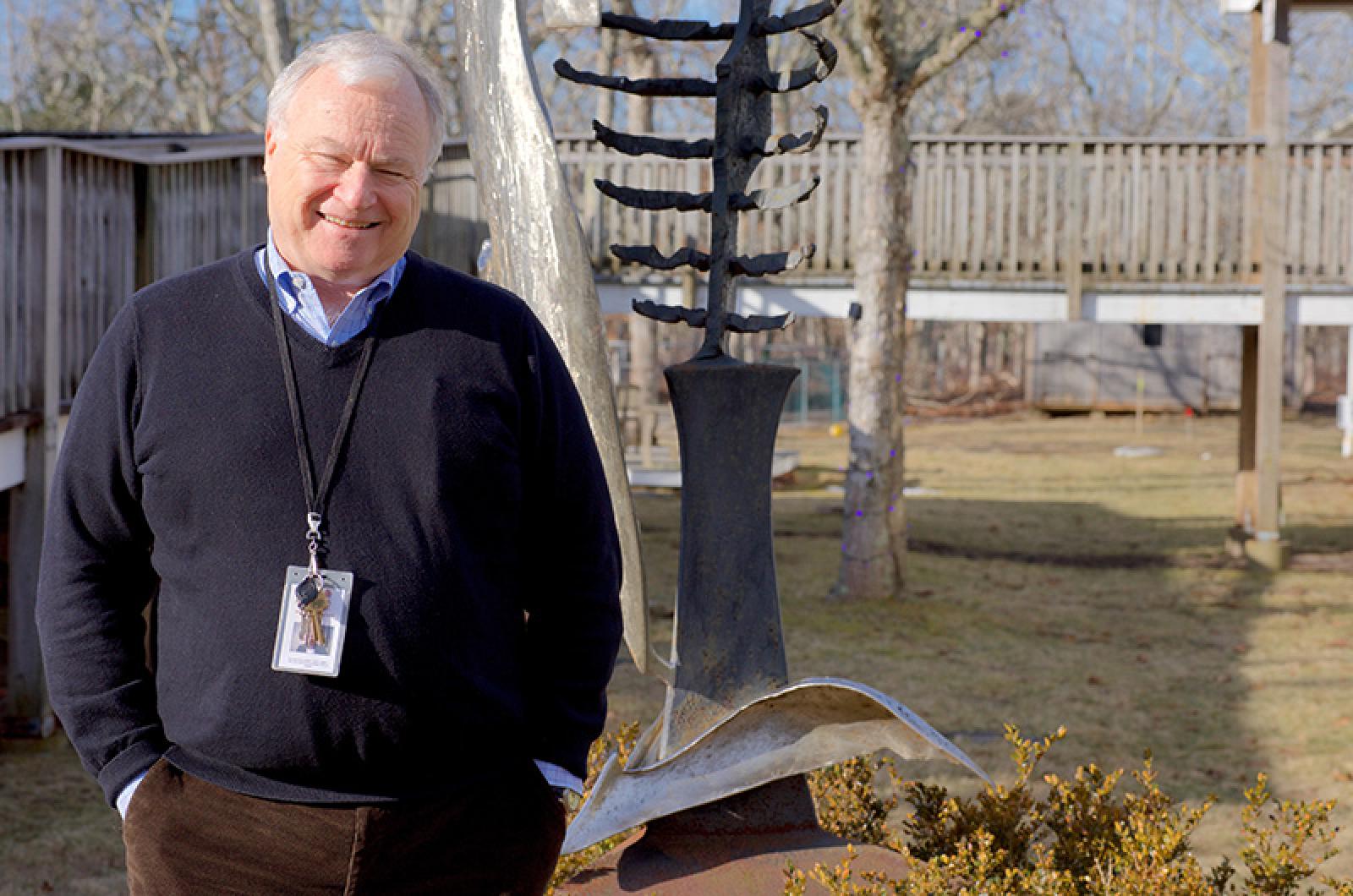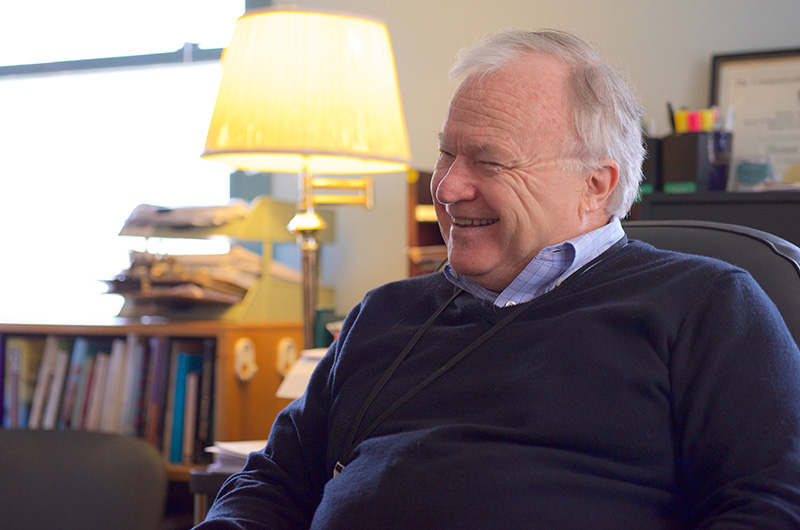It was the late 1960s and Tom Bennett, a Vineyard kid adrift in Europe, was lying in his sick bed at a hospital in Amsterdam when he thought about what he wanted to do with his life.
The recently discharged Air Force medic hadn’t cut his hair for months. He was running out of money. He needed work but couldn’t work, quarantined and suffering from a vicious strain of hepatitis he had picked up while traveling in Morocco. His liver was so swollen he could hardly breathe. At that moment, Mr. Bennett didn’t even know if he was going to have a life.
But if he did, he realized then and there what he wanted it to be.
“I went away to find myself,” he recalled. “And when I was in that hospital in isolation in Amsterdam, I had time to think. And I thought, I want to go back home. I want to direct my energy into being positive and helping others.
“I had these ideas of what I wanted to do organizing people. I wanted to coach Little League. I wanted to get involved in the community. And I knew I wanted to do something with people.”
Now the associate executive director at Martha’s Vineyard Community Services, Mr. Bennett has spent the past half century working with hundreds of combat veterans and thousands of Islanders, helping them cope with the traumas of their lives and past experiences — not unlike his own. Last week marked his 50th anniversary at the nonprofit, which has grown from a three-person operation in the 1960s to having more than 100 staffers and servicing more than 6,000 Islanders every year.
Family, friends and colleagues gathered at the Harbor View Hotel to celebrate him.
Mr. Bennett has spent his career working with people at Community Service, and has grown with the organization himself, from a lost youth to the bedrock of his community; from an uninitiated volunteer to the unquestioned patriarch of MVCS; from someone who didn’t know what he wanted to do, to someone who couldn’t imagine a life doing something else.
Through it all, he found a way to start a family, raise three boys, and of course, coach Little League. For him, that’s how he found purpose in life. And that’s what he tells the veterans he works with, too.
“We are driven to find meaning,” he said. “And that has to be by giving back to others. That’s why I encourage my peers to join committees. To work with Little Leaguers, to coach kids, because that’s what gives you meaning. And you feel like there is something to live for.”
Mr. Bennett grew up on the Vineyard, first on Chappy and then moving to the big city (Edgartown) when he was in grade school. Despite saving money for college, he decided to enlist in the Air Force. He became a medic, and was stationed in Maryland as a litter-bearer, carrying wounded soldiers off the plane as they returned with combat injuries from Vietnam.
The experience shaped him forever.
“You go from 19 years old to all of a sudden being pretty grown up. Life fasts forward. You can’t capture your youth again, even though you try,” he said. “I still can remember the back of the plane, seeing it come down and seeing all those guys on those litters. I saw a lot of wounded guys. It hit me.”
But being in the service provided Mr. Bennett with a new cosmopolitanism and world view. When he returned home after his bout with hepatitis, he reconnected with a mentor from his childhood, the Rev. David Smith, who introduced him to the Vineyard’s first psychiatrist and the founder of Community Services, Dr. Milton Mazer.
Dr. Mazer, a Vineyard summer resident, had been recruited to work on the Island during the height of the hippie era, as the Island became a small hot spot for young Americans who felt alienated from broader society. Some of them were suicidal. And the Vineyard largely welcomed them. In response, Dr. Mazer set up Community Services, among other things starting a hotline program that would allow youths on the Island to call if they were dealing with anything from depression to a bad LSD trip.
Mr. Bennett was chosen to lead the program. He eventually grew the hotline to include 70 volunteers, hiring people like Shirley (Tankard) Robinson to head up the Island Youth Center. His experience as a medic helped him work with young Islanders dealing with trauma.
“I was young, but I had some sophistication about the ways of the world, and people seemed to respond to me,” Mr. Bennett said. “I used to have to talk to the patients who were upset, soothe them, and try to help them. Especially the guys who I took off the plane who were wounded, who had lost parts of their bodies.”
It was at that time that Mr. Bennett met his wife, Carol Whitmarsh. They married in 1973. Mr. Bennett considers her his major support throughout his life.
“She’s the person who’s really made it possible for me to do what I’ve been able to do,” he said.
During the 1980s, Community Services went through its own set of trying times, struggling for funding and resources. Almost everyone at the organization credits Mr. Bennett with being a steady force that enabled it persevere. He has worked in a variety of capacities at the umbrella social services oragnization, spending 16 years as the programming director at the Island Counseling Center before becoming its associate executive director. Throughout the entire time, he has maintained a heavy caseload and worked specifically with combat veterans, leading veterans support groups and helping Islanders with PTSD.
He has also mentored and trained almost everyone at Community Services, from new program director Jennifer Vogel to David Araujo, who now heads the Island Intervention Center.
“There is no Martha’s Vineyard Community Services without Tom Bennett,” Mr. Araujo said. “It’s his knowledge base, his empathy, and his ability to connect with people. It’s ingrained in him and it’s something he’s developed over 50 years.”
Mr. Bennett’s process with clients developed out of the holocaust survivor Viktor Frankl’s experiences in concentration camps, called logotherapy. His office is papered in quotes from Mr. Frankl, and when Mr. Bennett speaks about his techniques he grows hyper-focused — his eyes narrow, and he is able to explain methods from exposure therapy to the Internal Family Systems model with the clarity of an elementary school teacher and the erudition of a scholar. He’s well read but has no pretensions, just a salt-of-the-earth crunch in his voice, textured with a soft, patient and caring tone.
Remember Robin Williams from Good Will Hunting? Pretty much the only thing Mr. Bennett is missing is the beard and the MIT degree.
“Tom is a God-given talent,” said Bob Tankard, who grew up with Mr. Bennett, is a fellow veteran, lifelong friend and still works with him in veteran support groups. “He is so sensitive. And he’s been doing this so long, he knows the soft spots and the hard spots. And he knows when a guy is just about ready to tip that edge, and he can bring them back. The veterans, they love him. They swear by him. And I know why.”
Spending 50 years working with combat veterans has presented its own challenges for Mr. Bennett, who said that he, too, uses the same psychotherapy techniques that he prescribes to clients.
“I’ve had to work at that over the years,” Mr. Bennett said. “It does affect you. What I’ve tried to do, and I learned this a while ago, is I try to have compassion for clients, rather than empathy. Because if you come from empathy, you are joining them. You are actually more effective if you can stay separate.”
He said over the years, he’s learned that the Island takes care of its own — an ethic that he believes is rooted in the Portuguese and Cape Verdean tradition of warmth and giving. The ability to be part of that is what has driven him for the past half century.
“When you see someone begin to have hope again, and they begin to feel like they are getting their lives back on track, it is exciting to watch. You also see some very emotionally tearing things that people go through. But I’d rather be in that position, working with people to try to help them, and achieve whatever goals they have to change their lives,” he said.
Mr. Bennett is 74. He has no plans to retire. And even if he did, Community Services has ensured that he will never truly leave the organization. During the ceremony honoring Mr. Bennett’s 50th anniversary last week, they announced that a wing of the new building will be named after him.
“I’m still working full time. I love what I do,” Mr. Bennett said. “But I want to give more. I’m trying to figure out how I can give more.”







Comments (13)
Comments
Comment policy »